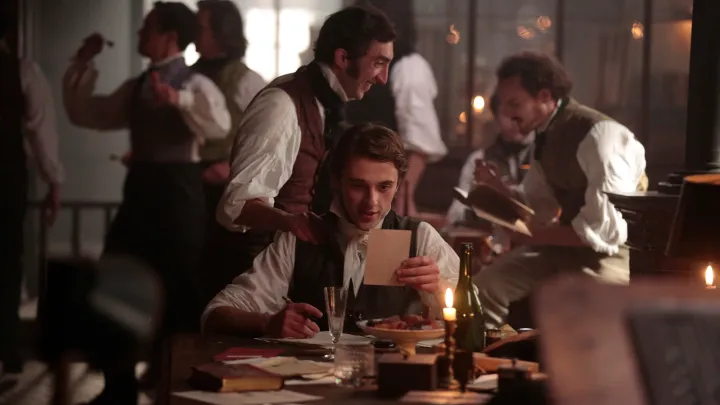Reviewed by GREG KING
Director: Xavier Giannoli
Stars: Benjamin Voisin, Cecile de France, Vincent Lacoste, Sabine Dewaels, Xavier Dolan, Gerard Depardieu, Andre Marcon, Jean-Francois Stevenin.

This lavish and sumptuous looking period drama from France was one of the hits at the recent Alliance Francaise French Film Festival, and now has hit cinema screens. Based on Illusions Perdue, the classic semi-autobiographical novel written by Honore de Balzac in 1843, Lost Illusions follows the rise and fall from grace of Lucien de Rubempre (Benjamin Voisin, from Summer Of 85, etc), a fiercely ambitious poet who aspires to become a writer in 19th century Paris.
An orphan who works as a printer with his adopted family in the province of Angouleme in rural France in 1821 Lucien is having an affair with the rich and influential Baroness Louise de Bargeton (Cecile de France, recently seen in Wes Anderson’s The French Dispatch, etc), his patron. She takes him to Paris with her but soon abandons him in the face of criticism from her rich and influential friends in the city.
Penniless and desperate he ekes out a living with menial jobs until he lands a job with a socialist newspaper run by the anti-establishment editor Etienne Lousteau (Vincent Lacoste, from The French Kissers, etc), and his eyes are quickly opened to a world of corruption. He becomes a theatre critic but soon learns that reviews are bought and sold by the highest bidder, and advertising revenue shapes the paper’s opinions. He begins writing scathing articles about Paris’ elite, which initially brings him a form of notoriety, but eventually leads to his downfall.
Lucien also becomes romantically involved with the naïve, young aspiring actress Coralie (Sabine Dewaels, from A Mother, etc), which leads to tension with the baroness. Amid much backstabbing he soon finds himself being set up for public humiliation by the baroness and some rich, powerful social climbing enemies.
Lost Illusions has been written by director Xavier Giannoli (Margeurite, etc), Jacques Fieschi and Yves Stavrides, who faithfully bring Balzac’s mean-spirited satirical novel and acerbic social commentary about corruption, the ethics of journalism, the role of influencers, and the pitfalls of fame, to the screen giving the material a contemporary relevance. The film boasts some stunning period detail that recreates Paris of the 19th century, with its brothels and theatres and dirty streets. The costumes from Pierre-Jean Larroque (who worked with Giannoli on Margeurite, etc) and production design from Riton Dupine-Clement (Benedetta, etc) are all fantastic, and visually create a divide between the world of the rich and the downtrodden who barely eke out an existence on the mean streets of post-revolutionary Paris. The cinematography from Christophe Beaucarne (Gemma Bovery, etc) is also superb. No wonder the film won seven Cesar Awards (the French equivalent of the Oscar), including nods for Best Picture.
The film boasts some fine performances from its ensemble cast who bring to life these ruthless people. In his biggest role to date Voisin is impressive as the naïve and ambitious Lucien, and Lacoste is also very good as the conniving Lousteau. De France brings a sadness to her performance as the elegant but cruel baroness, while Xavier Dolan (who directed Voisin in the gay themed coming of age drama Summer Of 85) is fine as the haughty novelist and main rival Nathan d’Anastazio, whose character is actually a synthesis of three characters from the novel. Veteran Gerard Depardieu contributes a small but important role as Dauriat, a greedy but powerful newspaper publisher.
★★★☆



